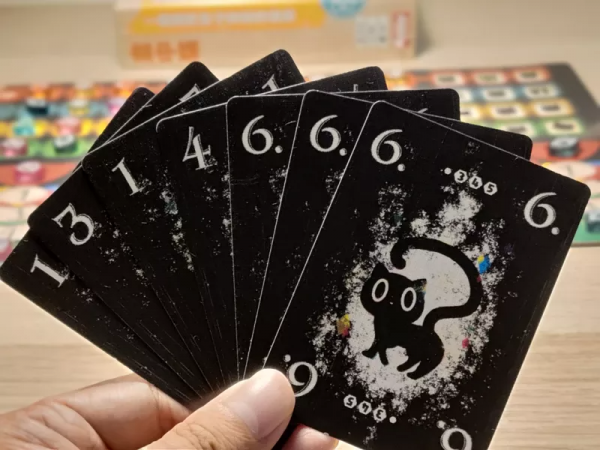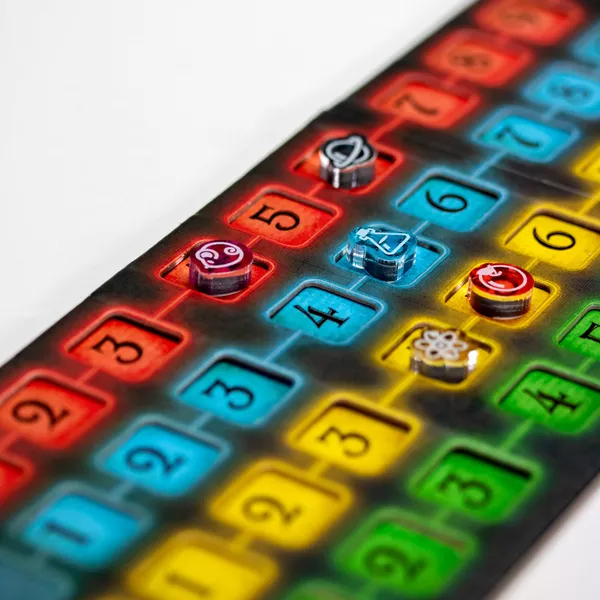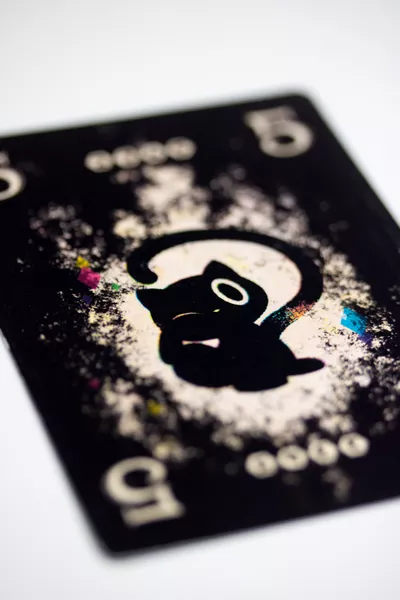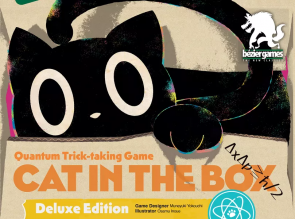How to shape reality with some cardboard and still not be sure you can win.
There's a long-running debate about randomness in board games. There are people that think it adds an essential element of suspense in games like Dungeonquest and those who think it spoils careful or tactical play in games like John Company. There are those who only want to be challenged by the presumed skill of their opponents in abstracts like chess and those who want everything to be a free-for-all like, say, Chutes and Ladders. But what a few of those hardcore "skill" types often miss is that being prepared for and able to adapt to randomness is a skill in and of itself. There's no greater example of that in the modern era than in the case of Cat in the Box, where said randomness is intentionally created by the players themselves; not with a roll of dice or other element of chance, but in creating a reality (the suit of a card) and trying to predict how the opponents will attempt to bend reality to their own expectations. If that sounds either intriguing or more power than any collection of cardboard should have, then read on.
Cat in the Box is based on the famous theoretical experiment imagined by physicist Erwin Schrödinger in a discussion with Albert Einstein about quantum mechanics. The basic principle of that branch of science is the idea that the particles that make up matter in the universe often act in a way determined by those observing them. The observer, in essence, has a hand in the makeup of the reality around them. This mirrors a number of other philosophical concepts that I won't get into here, but the basic idea put forth by Schrödinger is that there was no way to tell if a cat in a closed box was either alive or dead and, thus, it was simultaneously alive and dead (albeit not a zombie... presumably) until someone actually observed it. The game takes a tangent on this basic concept in the form of a trick-taking game. As with most games like this, players play a card in each trick and the card with the highest value wins the trick, based on either number or, if tied, by suit which is one of four colors (red, green, blue, yellow.) However, there are no colors on any of the cards in the game, so the "color" of each is determined when it's played. If I want my 8 card to be a blue 8, then I just declare that it is when I play it. The way I record that declaration is by putting one of my player tokens on the blue 8 of the Experiment board, which shows everyone just what has been observed throughout the round. After that, no one else can play a blue 8 during that round, so their 8s will have to be another suit.

Whoever leads the trick determines the lead color by what they play. Everyone else either follows suit or declares that they have no cards of that color in their hand and take a marker from their personal board that now shows that they have no more of that color. If I lead with a yellow 7 and someone doesn't want to follow, then the card they play brings a marker off their player board that shows they no longer have yellow cards, so they can't declare one to be yellow until the round is over, even if they wanted to. The highest card of yellow will win that trick, unless someone responds with a red card, since red is always trump over the other three colors. The first object of all of this is not only to win the number of tricks that you predict you can win at the start of the round (usually 1 to 3) but also to have the most markers in adjacent spaces on the Experiment board to gain bonus points for completing that bet. The second object is to not enter a paradox, which happens when you can't play a card from your hand that conforms to the reality that all of you have created. If all four 6 spaces on the board are filled and the only card I can play is a 6, that's a paradox and all of the points that I might have scored for winning tricks will now count against me. After playing as many rounds as there are players, the game is over and whoever has the most points wins.

I'm almost certain that that sounds incredibly confusing to many that are reading, but the game itself really isn't that complicated. It's just a trick-taker, like Spades or Bridge or The Crew or any other game of that ilk. But the dynamic between players, as you not only try to predict what your hand can do (as with most trick-takers) but also how your opponents' hands are going to change the very conditions of the game that you're playing, is more interesting than any game of that type that I've ever played. Not only do you have to try to read your opponents' hands based on the way they're playing (watching the Experiment board certainly helps with this) but you have to be able to keep from cornering yourself so that you don't fall to a paradox, and also think about how much room to give your opponents so that they don't fall to one and end the round before you can reach the goals that you've set for yourself. If I say I'm going to win two tricks then I need to win those two before the round is over or I get nothing from the bonus on the Experiment board. Of course, I'll also get nothing if I end up winning more than two tricks because I've held on to my high value cards for too long and start winning by default. But what if my 9, which would be any color I want it to be, gets taken out by a red 2 because red is always trump? How much attention does everyone pay to the board in trying to line up a nice three- or four-point bonus, as opposed to just making sure that you can last the whole round without paradoxing? With the rest of the players fully aware of the nice setup you're creating on the board, do they spend time in trying to box you out or do they simply pursue their own reality to try to maximize their own value? How much is gained or lost by everyone joining the gestalt or insisting on pursuing their own vision?

Those are strategic questions inherent to any game, but here they take on a seemingly deeper meaning because they're not being answered wholly by the game's components themselves- a card draw, a dice roll, a token placement -but partially by the whims of the players at hand. Schrödinger's idea was that the condition of the cat was determined by the viewer. Similarly, the game will be determined by whomever's vision is canny (catty?) enough to fit inside the confines of everyone else's vision but still be "better". It is truly a group operation here, but unlike something like The Crew, it's a completely competitive one that still utterly relies on those opponents to recognize what's taking shape in front of them and avoid the paradox that results from a misplay. It also avoids the exaggerated complaint that many have about "randomness", in that the deal is random (somehow, no one ever complains about that in games like Dominion) but you have two moments to determine the viability of the hand you're given: once on the initial discard (everyone discards one card face down to the center of the table before each round) and once again when you make your initial bet on how many tricks you think you can win. If you feel that the Random Gods have screwed you on the initial draw, then the safest bet is winning 1 trick. You can still win what could be the significant bonus points from the board by completing that one option and playing your losing cards strategically in an effort to build up the largest pattern. Those people trying to actually win tricks won't have as much opportunity to break up your board shape if they're trying to complete their own bet. But play on the board remains important, not only to disturb the plans of your rivals, but also to hedge your bet (almost literally) in terms of the bonus that you might receive.
The permutations from this game might genuinely be endless because it's dependent not only on a widely-varying draw, but also the intermingled approaches of each player. Unlike games where you're actually subject to the draw that you've gotten, in this game you're able to change the impact of that draw based on what other players are doing. Yes, you could have a hand of low cards, but if you end up at the end of the play order (whoever won the last trick leads the next one), you could always play one of your low number cards as a red which will trump everything before it if people either followed suit or played another non-red suit. But remember that that will be the last red card you can play that round unless someone else leads with red (which can only be done after another red card has already been played.) If someone else does lead with red, you'll be stuck removing another token from your board and reducing yourself to only having two suits in hand for the remaining tricks. That same situation arises with any other color where you choose to not follow suit early in the round. You can only shape reality so many times before the cat is either alive or dead. And, similarly, you either survive the round or get knocked out of it.

This is, without a doubt, the most fascinating card game I've played in ages. The one caveat is that it plays well at 2 or 3 players, but masterfully at 4 or 5. The best experience I've had was definitely at 5. While the change in available cards and board spaces is set up to scale based on the number of players, the expansion of possibilities with more players involved seems to exceed what the greater options of more cards and spaces actually provides. In other words, it seems like there are more possibilities in the universe with more players... because in a way, there are, since there will be more changes in the flow of the game with more minds involved in determining what the present reality happens to be. My present reality is that if I were inclined to do things like "Top games of X time period", this one would definitely be on that list. But which time period? I guess you'll have to try to determine that for yourself.
 Games
Games How to resolve AdBlock issue?
How to resolve AdBlock issue? 



















